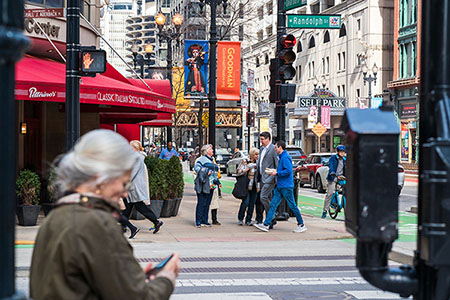Overwhelming support for landmarking Marina City, claims alderman
22-Sep-08 – 42nd Ward Alderman Brendan Reilly says based on responses to his May 12 letter to Marina City residents, there is “overwhelming” support for official landmark status. On August 12, Reilly again wrote to residents, announcing he had started the formal process to seek landmark designation for the 48-year-old complex. Meeting with Marina City Online at City Hall on Monday, Reilly said he first heard about interest in landmarking from Marina City residents who contacted him for assistance.
Reilly would not give a more precise figure, but he says the number of responses to his May 12 letter was “in the hundreds.” The population of Marina City is estimated at 1,400. “While the petitions that were circulated within the building are certainly a part of my considerations,” he says, “I consider the response and feedback to my letter to really be the final determining factor.” At the same time residents were getting a letter from Reilly, commercial tenants at Marina City were getting one, too. That resulted, he says, in just two phone calls – from House of Blues and Hotel Sax. Reilly says he explained to them that their current space is “grandfathered in” if landmark designation is granted. “Obviously, that calmed people down. Most people there have what they need as far as the commercial space goes.” Reilly also spoke with landmark experts such as the City of Chicago Landmarks Division, Preservation Chicago, and Landmarks Illinois. “Over the past 20 years in downtown Chicago…a number of historically significant buildings have been threatened…and in many cases that’s occurred because of a reluctance to landmark those structures.” He says good examples are the Medinah Temple (pictured below) and Tree Studios re-developments. Built in 1912, Medinah Temple on North Wabash Avenue was designated a Chicago landmark in 2001. The former Shrine temple was reconstructed for use as retail space and is currently occupied by Bloomingdale’s Home and Furniture store.
Tree Studios, originally built in 1894, was restored, landmarked in 1997, and now houses studios and related art businesses. “Those structures were at risk of being demolished, and were it not for some very creative redevelopment support from the city, those would be lost forever.” Frustrated by Dick’s Last Resort Reilly describes a frustrating lack of cooperation by Dick’s Last Resort that conflicts with accounts by executives of the Dallas-based restaurant chain that will open at Marina City in October. “I have been trying to get Dick’s Last Resort to behave as a good neighbor and address some of the residential concerns with them moving into the building. As alderman, I can’t dictate who landlords lease their properties to. However, I do have a responsibility to the residents of Marina City to make sure that this new neighbor is respectful as possible.” He claims concerns about noise and physical alterations such as the “garage doors” have not been addressed by Dick’s Last Resort, and getting a commitment out of DLR to keep doors sealed and soundproof while music is being played “has been like pulling teeth.” In July, however, Steve Schiff, CEO of Dick’s Last Resort, showed Marina City Online the extra soundproofing that had been installed in response to resident concerns. Three forms of soundproofing include material sprayed beneath the concrete floor to reduce vibration coming from sound sources within the restaurant. Panels made of a material called Tectum were installed in the ceiling. And in the east wall separating the band area from the residential mailboxes, four layers of sheet rock were installed instead of two layers that were originally planned. Schiff says the aluminum and glass panel doors installed in late July on the south wall will keep sound levels below the 45 decibels allowed by city code. He says they will measure the sound periodically and keep the doors closed when a band is performing.
But, says Reilly, “I’ve been waiting just for a simple letter of agreement from Dick’s Last Resort and we still haven’t received one. It’s my hope that they’ll come around and start behaving like a good neighbor before they open for business.” Landmarking to have little impact on residents If landmark status is granted, Reilly says from a practical standpoint, for a residential property owner, virtually nothing will change. Commercial tenants, however, will have to submit for city review any proposed signs or changes to the facade of the structure or interiors – if the interior can be seen from the outside. “Your interior build-outs in the residential properties,” Reilly reassures, “will not be impacted.” Reilly says the condominium documents that govern the property are more strict than anything the landmark ordinance will impose. “There’s no additional burden to the residential property owners.” Reilly says there will be another mailing to Marina City residents, this time from the City of Chicago Landmarks Division. The Landmarks Division will prepare a report, explaining why the property should be given official designation – and documenting how the complex looks to serve as a guide later if a change is requested. Says Reilly, “They just want to make sure they’re sensitive to the features that make this landmark-worthy. So it doesn’t mean [changes are] forbidden, it just means they’re more carefully scrutinized.” At some point, there will be public hearings at City Hall. The process could take another few months.
|

















